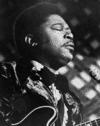- King, B.B.
-
born Sept. 16, 1925, Itta Bena, near Indianola, Miss., U.S.U.S. blues guitarist.Reared in the Mississippi Delta, he was influenced early by gospel music. He worked for a time as a disc jockey in Memphis, where he acquired the nickname B.B. (for Blues Boy). His first hit, "Three O'Clock Blues" (1951), was followed by a long succession of others, including "Every Day I Have the Blues" and "The Thrill Is Gone." To his own impassioned vocal calls, King played single-string guitar responses with a distinctive vibrato, in a style influenced by Delta blues guitarists and jazz guitarist Django Reinhardt. By the late 1960s rock guitarists were acknowledging his influence and introducing King and his guitar, Lucille, to the white public. He remains the most successful bluesman of all time.
 B.B. King, 1972By courtesy of Sidney A. Seidenberg, Inc.
B.B. King, 1972By courtesy of Sidney A. Seidenberg, Inc.* * *
▪ American musicianbyname of Riley B. Kingborn September 16, 1925, Itta Bena, near Indianola, Mississippi, U.S.American guitarist and singer who was a principal figure in the development of blues and from whose style leading popular musicians drew inspiration.King was reared in the Mississippi delta, and gospel music in church was the earliest influence on his singing. To his own impassioned vocal calls, King played lyrical single-string guitar responses with a distinctive vibrato; his guitar style was influenced by T-Bone Walker (Walker, T-Bone), by delta blues players (including his cousin Bukka White), and by such jazz guitarists as Django Reinhardt (Reinhardt, Django) and Charlie Christian (Christian, Charlie). He worked for a time as a disk jockey in Memphis, Tennessee (notably at station ), where he acquired the name B.B. (for Blues Boy) King. In 1951 he made a hit record of "Three O'Clock Blues," which led to virtually continuous tours of clubs and theatres throughout the country. He often played 300 or more one-night stands a year with his 13-piece band. A long succession of hits, including "Every Day I Have the Blues," "Sweet Sixteen," and "The Thrill Is Gone," enhanced his popularity. By the late 1960s rock (rock and roll) guitarists acknowledged his influence and priority; they introduced King and his guitar, Lucille, to a broader white public, who until then had heard blues chiefly in derivative versions. King's autobiography, Blues All Around Me, written with David Ritz, was published in 1996.Additional ReadingCharles Sawyer, The Arrival of B.B. King (1980).* * *
Universalium. 2010.
